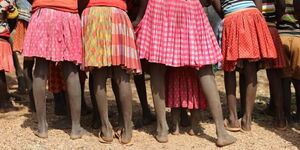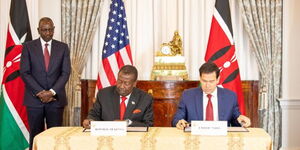Deputy President Rigathi Gachagua on Thursday, February 9, admitted that Kenya lost livelihoods valued at Ksh187 billion (USD1.5 billion) in the last year.
The DP made the revelations during the 45th Annual Lions Day celebrations at the United Nation's headquarters in Gigiri.
He explained that the drought situation had worsened across the country affecting 5.3 million people in 31 counties and the wildlife was not spared either.
"We are in a crisis. No doubt, the world is bleeding from the impacts of climate change. Kenya is bleeding from the impact of climate change. To demonstrate the impact of climate change, Kenya has consecutively missed five rain seasons. We are deep into one of the longest droughts in four decades.
"As a result, more than 5.3 million Kenyans are facing starvation in 31 counties across the country, while livelihoods worth USD 1.5 billion have been lost in the last one year. Wildlife- one of our leading foreign exchange earners, has also not been spared. The drought is threatening to drive the world’s heritage- the wildlife- to oblivion," the DP stated.
He further noted that the worsening situation had affected children and women - especially lactating mothers - the most.
Gachagua, therefore, called upon the international community to chip in and help suffering communities of the affected counties access their basic needs.
"While Kenya is taking immediate and a few long-term measures in response to drought and famine, we cannot manage the situation alone. We need children in school otherwise they will be left behind. We need safe pregnancies and deliveries but malnutrition among expectant and lactating mothers and children threatens to erase gains made in suppressing mortalities in these vulnerable groups.
"The ripple effect is that hungry people cannot escape poverty, they cannot be healthy, they cannot go to School, and they cannot be peaceful. In short, there is a direct link between food security and the achievement of all the Sustainable Development Goals in which we seek to Leave No-one Behind," he added.
UN and other players have donated foodstuffs among other items worth Ksh47.8 billion towards emergency response in the past few months but the situation continues to grow dire.
To alleviate the effects, the Kenya kwanza administration is laying short and long-term strategies and investments which include drilling more boreholes, and intensifying water harvesting through mega-dams across the country to restore human dignity.
Collectively, 70 million people are on the brink of starvation in Kenya, Ethiopia and Somalia with the latter being the most affected.












